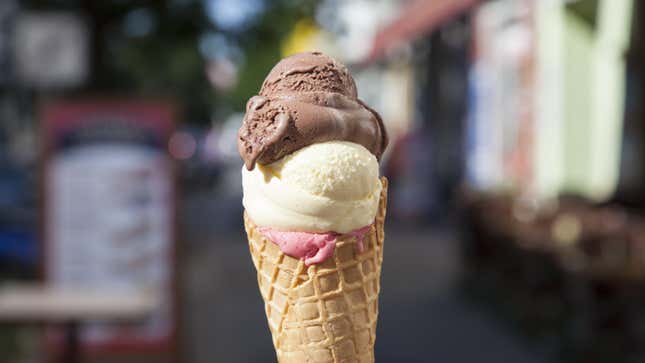
When a restaurant’s business is struggling, as it so often is, going viral on social media can seem like a gift from above. With positive attention gained seemingly overnight via platforms like Instagram and TikTok, even a restaurant on the verge of financial ruin can get a much-needed cash infusion and gain a consistent flow of customers. But for all the good luck it seems to be, there are pitfalls to this kind of fame, too. The New York Times recently reported on one business whose TikTok success sounds downright annoying.
How TikTok fame can be bad for business
The New York Times highlights Folderol, an ice cream shop and wine bar in Paris owned by married American couple Jessica Yang and Robert Compagnon, who also own the Michelin-starred restaurant next door called Le Rigamarole.
Because Le Rigamarole is a fancy dining destination, the couple wanted to open a casual, family-friendly spot where parents could chill with some natural wine while their kids enjoy ice cream cones. Folderol was the result, opened in 2020.
Earlier this year, the business started to see an increase in foot traffic, due in large part to a surge in tourism that saw many more people traveling to Europe. However, people also started learning about the business specifically through TikTok.
If you search TikTok for “Folderol,” you’ll find a ton of lifestyle accounts and assorted influencers documenting their visits. Most videos show fashionably dressed young people drinking wine on the curb outside the shop, which fits the romantic impression people have of Paris and its street life.
As new throngs of people started flocking to the restaurant, Yang found that they weren’t actually there for the ice cream or the wine, but rather for the selfies and the internet clout that came with them.
“They don’t even taste the ice cream,” Yang told the NYT. “They just let it pool into a bowl of melting liquid and die in the sun.”
Food waste wasn’t the only problem, either. Some regulars stopped visiting due to the lines, and neighbors called the police about the crowd not once, but four times. Beyond that, customers were stealing the unique glassware that the ice cream was served in, which had been sourced at flea markets and couldn’t be easily replaced. The owners decided they had to gain control of the situation.
Yang and Compagnon decreased the amount of wine glasses they had on hand to serve wine. They posted signs next to their front door reading “No TikTok,” and they even hired a bouncer to manage the crowds. In July, they simply prohibited people from sitting outside the shop altogether, which finally repelled the clout chasers.
While the shop was closed for its annual August break (this is Paris, remember), pop star Dua Lipa told Vogue France that it was one of her favorite French restaurants. But even after it opened back up, things had noticeably calmed down, and people had apparently remembered how to behave.
How other restaurants deal with TikTok fame
Earlier this year, Waffle House saw a resurgence of interest among young customers thanks to a series of menu hacks floating around social media. One Atlanta-area location got so fed up with the behavior that it posted a sign reading, “ORDER FROM THE MENU WE ARE NOT MAKING ANYTHING YOU SAW ON TIKTOK!!”
One restaurant in Italy was quickly overwhelmed by increased foot traffic last year thanks to an employee who had been posting TikTok videos of how each sandwich was assembled. Though he amassed more than 1.5 million followers in the process, and inspired multiple people to fly all the way to Naples just to taste his creations, the employee was banned him from making videos at the shop altogether.
It’s certainly not all bad, though. One of Keith Lee’s videos actually saved a struggling pizzeria. But in Folderol’s case, the TikTok explosion is just a reminder that sometimes the social media draw of a restaurant isn’t always about the food so much as the vibe—and that can have irritating consequences.